Hi, I’m New York Times best-selling author Ramit Sethi, and I’m going to show you how to make more money fast, legitimately, and with immediate results.
This is easily one of my most popular articles. That’s why I’ve updated this article to include the very best tips on how to make money for 2018.
For the next six minutes, I’ll teach you how to earn more money after one conversation with your boss, how to lower every single one of your bills, and how to start making money with a side hustle THIS WEEK.
Then we’ll get into how to optimize your career and job – the easiest way to make the most money FOREVER.
We’re going to focus on Big Wins. That means clear, actionable advice that you can start implementing today.
That means we’re not going to tell you to:
- Take online surveys for literally tens of dollars
- Sell your plasma/hair for quick cash
- Cut out lattes or skip lunch to save money
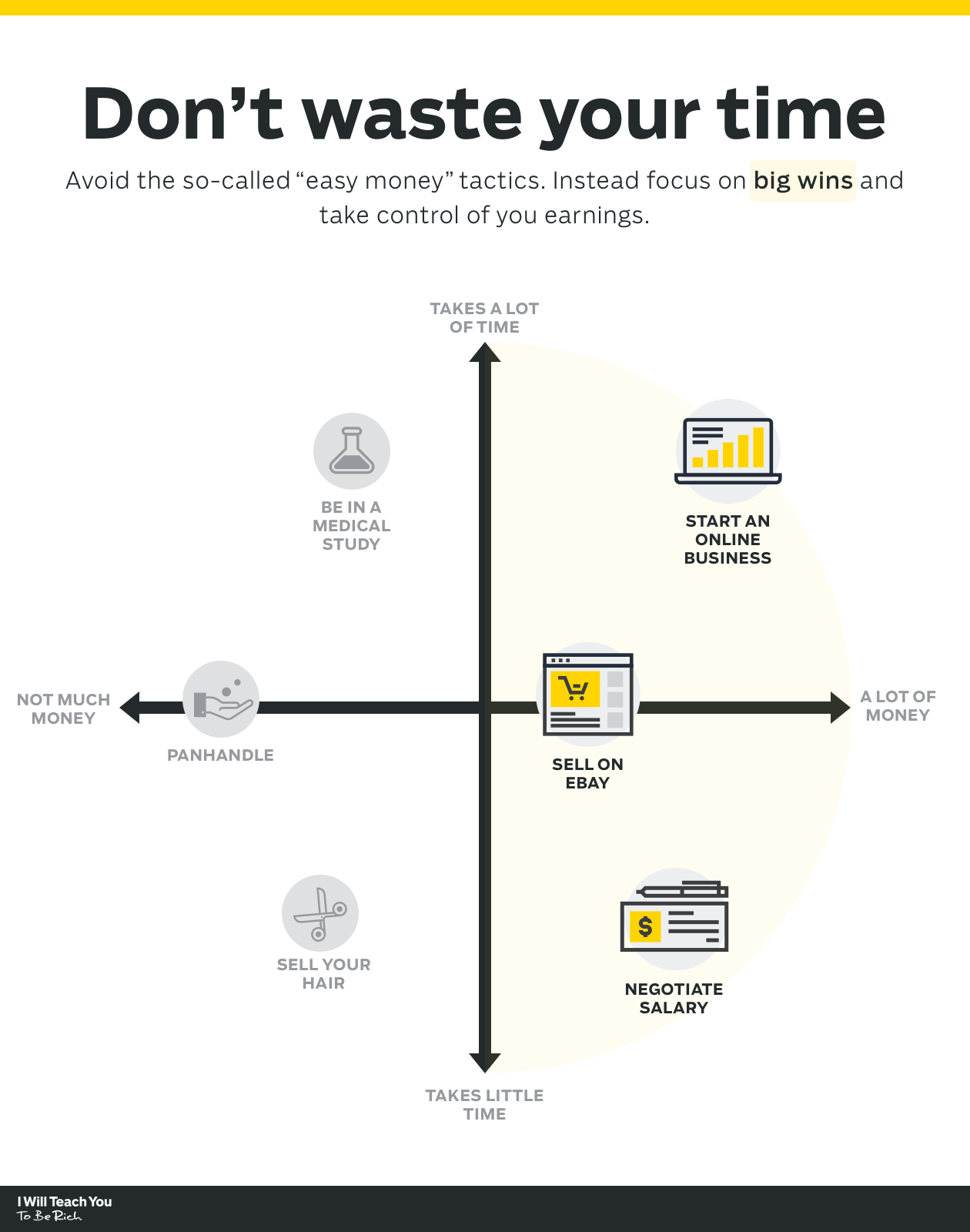
These are what I call Big Wins — the types of strategies that will show you how to earn money while setting you up for long-term success. But long-term does not mean “delayed.” There are easy ways to make quick money. But you need to think big.
That’s why we’ll tackle this in two, equally important sections.
Section 1: How to make money THIS WEEK. Non-scammy ways you can make more money fast to get your head above water within seven days. Note: All of these have LONG-LASTING effects.
Section 2: How to make money FOR THE REST OF YOUR LIFE. Long-term systems to dramatically increase the money you make in your LIFETIME. My students have gone from starting freelance gigs on the side all the way to six-figure businesses. They’ve also tripled their salary in a matter of months.
This is a long post with a lot of information. Follow the instructions below and we’ll show you where you should focus your efforts:
- Section 1: How to make money THIS WEEK
- Section 2: Make more money FOR THE REST OF YOUR LIFE
- The single best way to earn money
Section 1: How to make money THIS WEEK
Money tip #1: Negotiate your salary
I LOVE salary negotiations!
With just a five-minute conversation you can make thousands more and, what’s better, the gains add up year after year.
This is a proven way to earn more money through a single conversation. It’s essentially quick money that — unlike taking surveys or selling your body to medical studies — gives you a LOT of money over many years.
Check this chart demonstrating the effects of ONE $5,000 raise:
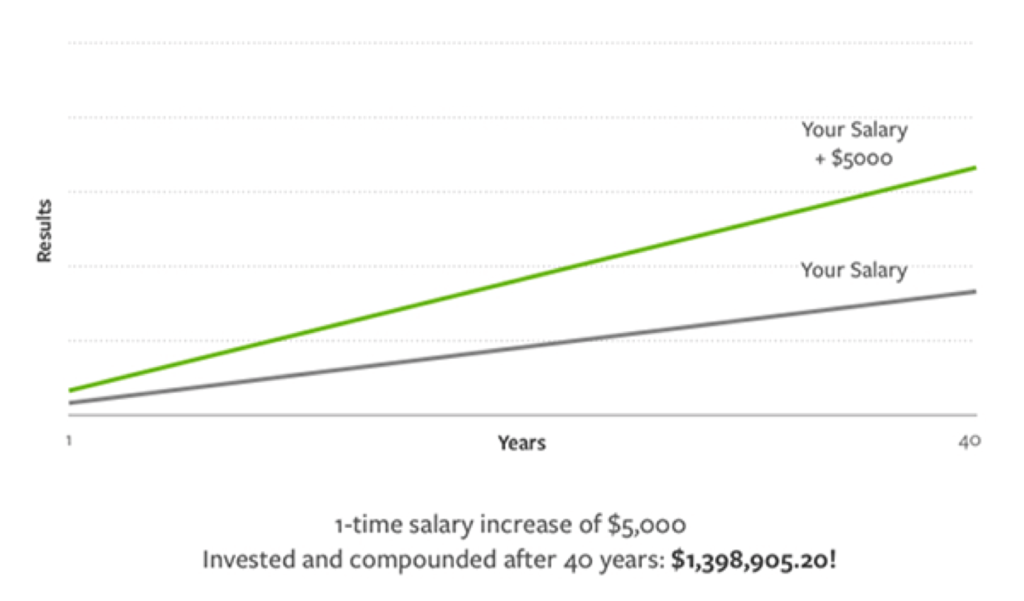
Learning how to make more money via salary negotiations is simple — though it’s going to take a little bit of work on your part:
Step one: Find out! Use sites like PayScale.com, Salary.com, or Glassdoor.com and get the salary range for your job and location.
Step two: Give the heads up. Let your boss know you’re preparing to discuss salary with him or her. I cover how to do that in the 14-minute video below.
How to negotiate your salary
Step three: Use the Briefcase Technique. Before even stepping foot into the room, use my tried and true Briefcase Technique. This is something my students have used THOUSANDS of times for IMMEDIATE gains in salary.
The Briefcase Technique
Now, two big roadblocks might arise.
First, if you’re not good at your job, there’s no amount of negotiating that will help.
That’s why I love salary negotiations. Not only is it a good incentive for you to work harder and become a Top Performer, but you also stand to gain a lot of money from the hard work.
FACT: Doing a good job at work 10x’s your chances of making more money.
But if you’re going through your job just HOPING you’re doing a good job, you’ll be forgotten when it comes times for raises — and you won’t earn more.
Just like great companies get inside the heads of their customers, Top Performers figure out EXACTLY what their bosses want and optimize their strengths accordingly.
Tie everything you do to whatever goal is important to your boss and remind them often. This is how people become indispensable.
See my interview with Michael Williams for more:
Second, your company might tell you that they simply don’t have enough money to give you a raise. Get around that stonewall using the systems I outline in the video below.
Ask Ramit: How can I negotiate salary when they tell me they can’t pay more?
Once you have all of your prep ready, you’re good to go. But if you’re a weirdo overachiever like me, you can also check out my complete guide with scripts, more videos, and common mistakes here.
Negotiating your salary takes a bit of upfront work, but just ONE conversation can be worth thousands. It’s one of the easiest ways to make money.
The best way to make money fast is not to reinvent the wheel and to leverage the sources of income you already have. So the next time someone tells you to get more money by cutting back on lattes or by picking up loose change, grab them by the shoulders, and shake them for me.
Be sure to remind them that you’d have to skip out on 1,370 lattes in order to save $5,000 (or they can just get a one-time raise).
Read even more: Salary negotiation: How to negotiate better than 99% of people
Money tip #2: Negotiate your bills
The awesome thing about negotiations is you can do it with practically every service you pay for. That includes the fixed costs you pay each month.
Things like:
- Credit card rates and fees
- Gym fee
- Cable fee
- Cell phone fee
- Car insurance
With a quick phone call you can get these costs lowered, putting more money directly in your pocket.
Because the dirty secret is that most of these companies rely on thousands of people to zombie walk through their payment process. That’s why your cable company seems to jack up rates every year. They know you’ll likely just shrug, throw it away, and carry on with your day.
NOT TODAY!
Save $1,000 with 5 phone calls
By calling these companies and asking one simple question, you open the door for more money in your pocket. Just remember two magic phrases:
- “Times are tough.”
- “Is there anything you can do for me?”
Example conversation:
You: Hi, I was looking at my plan and it’s getting pretty expensive. Could you tell me what other plans you have that would save me money?
Them: Blah blah same plans as on the website blah blah
You: What about any plans not listed on the website?
Them No, what we have is listed on the website. Plus, you’re on a contract and have an early cancellation fee of $XXX.
You: Well, I understand that, but I’d be saving $XXX even with that cancellation fee. Look, you know times are tough so I’m thinking of switching to [COMPETITOR COMPANY]. Unless there are any other plans you have…? No? Ok, can you switch me to your cancellation department, please?
The key is to be nice. Be cordial and ask them what better plans they have to offer you. Nothing’s going to get you shot down quicker than getting angry and screaming, “HOW DARE YOU SCREW ME OVER WITH THESE PRICES. I WON’T STAND FOR IT. GIVE ME LESS FEES … uh please?”
If you mess up or things don’t go as planned, don’t worry. Hang up and call back. You can always play around with a few phone calls and see what works best.
When you get to the customer-retention department, restart the sequence. This is when you pull out your competitive intel on the other services being offered.
If Verizon is offering something for $10 less, tell them that. That’s $120 savings / year right there. But you can do more.
You: Listen, you know times are tough and I need to get a better deal to stick with you guys. You know and I know that your customer acquisition cost is hundreds of dollars. It just makes sense to keep me as a customer, so what can you do to offer me this plan for less money?
Notice that you didn’t say, “Can you give me a cheaper plan?” because yes/no questions always get a “no” answer when speaking to wireless customer service reps (or anybody whose job it is to get you off the phone and out of their hair as soon as possible).
Instead, ask leading questions. You also invoked the customer-acquisition cost, which is meaningful to retention reps. Finally, it really helps if you’re a valued customer who’s stuck around for a long time and actually deserves to be treated well.
Money tip #3: Find your first freelance client
I’ve said it before and I’ll say it again: There is a limit to how much you can save, but there is no limit to how much you can earn.
Finding a new job or changing careers takes time (we’ll get to that). But in the next few days you can set up your first side hustle and make money fast.
The best part: Freelancing is a skill. That means you can get BETTER at it with time.
And once you get your first paying client, it’ll be easier to get more clients and make more money.
First thing: So many other websites will tell you to troll for freelance gigs on places like Elance or Mechanical Turk. These places work if you want to compete with people all over the world in a race to do the most work for less. No thanks.
Look at what you’ve already got. 95% of jobs can translate into some sort of side gig. Ask yourself:
- What do I enjoy?
- What do I do with my free time?
- What do people ask me to do because I’m so good at it?
People are very bad at identifying their own skills. They’ll say things like, “I dunno … I guess I’m good at writing and communication, and, like, general organizational skills…” AMAZING!! HERE’S A $4,000/MONTH RETAINER!!! (Sorry, won’t happen.)
Repeat this over and over: People pay for solutions, not your skills.
For example, I was on a webcast where I was suggesting ways for people to earn money on the side, and I mentioned that I hate cooking, am not good at it, and would love it if someone cooked for me.
I got an email later that night from someone who said, “Ramit, I can help. I can teach you everything you need to know over one weekend, and you’ll know 3-5 great dishes to cook.” I appreciated the offer, but wrote back, “Thanks for the offer! But you don’t understand. I don’t want to learn — I want someone to do it for me.”
Again: People have problems. And they want solutions.
They don’t care what you’re “interested” in. Are they too busy to organize their closet? Do they need someone to help them redesign their website? Maybe they want someone to teach their kid how to play flute.
Start off by assessing the skills you use every day at home or at work.
Typically, you can break these down into two areas:
- Skills. These are things you have expertise and knowledge in (e.g., languages, coding, copywriting).
- Passions. These are things you love to do in your free time (e.g., playing musical instruments, volunteering to take care of animals, genealogy work).
Take some time right now to write down 10 – 20 ideas of different skills and talents you have.
After you’re done, let’s take a look at an example of this in action. Maybe your list looks like:
- Do a little PHP coding
- Organize systems
- Automate complex processes
- Project manage
- Create technical documents that can be understood by lay audiences
- Lead a team
Now ask yourself: Which of these skills can solve a specific problem? Brainstorm those out. Don’t censor yourself — put everything down.
- I could do some PHP coding, but I’m not the best.
- I could help businesses automate and streamline their income-generating processes. Vague, but okay.
- I could manage projects and lead teams towards deadlines / organizing. This is super vague, any 22-year-old college grad would say he could do the same, and it doesn’t take advantage of my specific skills. Skip this.
- I could be a technical writer and help companies demystify their technical-support documents. I could even rewrite the technical portions of their websites to make them more comprehensible to normal people, especially companies in the consumer energy field. Very promising, especially since I follow a few of these companies online.
Each of these individually is a potentially viable freelance trade – can you pick one and do it? The answer should be YES/NO to each. Put “YES” if even remotely feasible.
- PHP coding: YES
- Automate systems: NO (too vague for me to know where to start)
- Project manage: NO (too vague)
- Technical writer: YES
Excellent. Now you have a list of skills that might potentially be profitable.
Optional: Combine skills together to make a more compelling, more niche offer.
You can often charge more and help clients more by packaging offers. In this case, it’s not very relevant, since technical writing and PHP coding are pretty different. But one of the people who helps on IWT pitched me to do video editing + marketing. Perfect fit. I hired him.
Next step: How can you prove to people that you’re knowledgeable enough for them to pay you?
The first thing I do when evaluating someone is look at their portfolio and past clients. At least half of potential hires don’t have this section. Easy solution! I move on to someone who does.
- For our systems engineer, can he point to a PHP project he did on the side?
- What about a sample of technical writing where he turned something very complicated into something totally palatable?
Last step: Start finding clients. With your offering in place it’s time to find potential clients. Sure you could randomly print business cards or set up a blog. But before doing ANY of that you need to make sure you have something people want.
– Identify your clients. Who are they? What are their hopes and dreams? How old are they? What do they do? Are they married? How big is their company? (More on getting your first 3 clients here.)
– Reach out directly. Lots of people set up a Twitter account and wait for the world to come to them. DON’T DO THAT. Once you’ve identified your potential client, email them directly. Example email:
Hi Mike,
My name is Ramit Sethi and I’m a recent Stanford grad. I’ve been reading your blog for two years (I loved the post about using virtual assistants and got BOTH of my brothers to start using one), and it’s really helped me be more efficient with my work.
It occurred to me that you’re probably interested in growing your blog. I might be able to help. I’ve done video editing (https://ift.tt/2vXDo7q) and PowerPoint design (https://ift.tt/2wx6lKM). Imagine doing a great video on using virtual assistants, then distributing it through your newsletter. I could do one for you in about 2 days if you’re interested.
How about chatting later this week? My # is XXX-XXX-XXXX or I can give you a call at your convenience.
Thanks,
-Ramit
This email script has generated thousands of dollars for my students and can help you connect deeply with your potential clients and begin a relationship that can lead to your first paying client.
More resources that may help:
- My Ultimate Guide to Digital Marketing
- 3 counterintuitive secrets about earning more
- How to raise your hourly rate
Want more? I have an entire course on how to earn your first $1,000 on the side.
Money tip #4: Negotiate your rent
I’d bet that rent is your biggest expense. Save $100 on your rent and that adds up to $1,200 a year with ONE conversation. Or you could collect 24,000 cans and recycle them. Your choice!
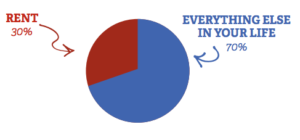
Of course, you can’t just say, “I want to take $200 per month off my rent!” You have to be ready to offer something in return.
What does your landlord really want? Money, of course. But dig deeper and you’ll find there’s a lot more you can offer. The goal is to give them something you don’t care about in exchange for something you do.
Here are a few things many landlords will happily lower rents for:
- Prepay months in advance
- Sign an extended lease
- Offer to extend the termination notice from 30 days to 60 or 90 days
- Offer to give up your parking space if you don’t have a car (the landlord could charge another tenant for an extra space)
- Promise not to smoke in the apartment (this will save the landlord money when you move out)
- Promise not to keep cats even if they’re allowed (another cleaning expense for the landlord)
- Make a deal for referrals if they have low occupancy
If you know what you want and you know what they want, the chances of succeeding in your negotiation increase significantly.
Hi Jim,
I hope you’re enjoying the start of summer in the Bay. Since our 1 year lease is almost up, I’d like to chat about re-signing.
As you know, I love the apartment. I’ve gotten to know the neighbors and feel truly at home in the neighborhood. I hope to be able to stay here for a while yet.
I’ve been looking at rental prices around the area, and would like to talk with you about adjusting the rent to match what I’m seeing around town.
I’d also be more than happy to help out around the property — taking out the trash and recycling, clearing and cleaning the backyard, or any other duties that might need some attention. I love living here and hope that the relationship with you and the property is just beginning.
I can chat on the phone any time you’re free today or this weekend.
Talk to you soon,
Susan
Section 2: Make more money FOR THE REST OF YOUR LIFE
Negotiating your salary, bills, and picking up some side work are all quicker wins. But while your motivation is high, you can also begin some larger efforts with a few of my favorite systems. Especially for most of us, where our job is a huge portion of our income. Some approaches to make the most of your career:
Money tip #5: Change your job
Should you change jobs? Change industries? How do you know whether to stay put or to take a risky move that will result in more money? By using the Bezos Regret Minimization Framework.
Ask yourself: Which will you regret more 20 years from now: Staying in your current situation or trying something new and failing?
And remember: the more responsibility you have, the more money you can command.
More on that here:
Deciding when to take risks in life.
Money tip #6: Invest to earn seven figures over your life
A common chorus I hear from older people is how much they wish they got started investing earlier in their lives. That’s because investing is the most important factor determining your future financial success.
This isn’t just me saying that either. In fact, there’s more than 100 years of evidence in the stock market testifying to that.
For example:
Imagine you’re 25 years old and you decide to invest $500/month in a low-cost, diversified index fund. If you do that until you’re 60, how much money do you think you’d have (assuming a 5% return)?
Take a look:
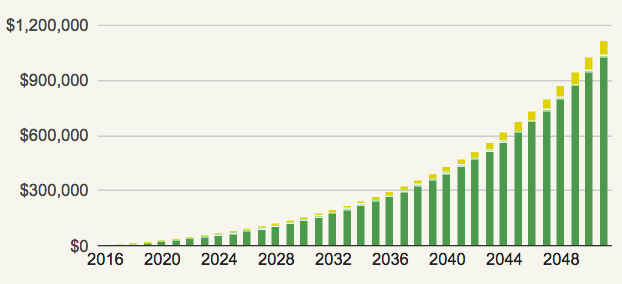
$1,116,612.89.
That’s right. You’d be a millionaire after only investing a few thousand dollars per year.
NOTE: I’m not talking about trading individual stocks, wearing a power suit with shoulder pads, and making “deals.”

Hollywood ≠ reality.
The type of investing I’m talking about is in low-cost, diversified index funds over decades.
Smart investors value consistency over anything else. Not the “hottest” stock. Or fad investments.
But this all begs the question: What should YOU invest in?
Two things:
A 401k through your employer
A 401k is an investment plan offered by companies. The good ones will offer an employer match.
These investment accounts use your pre-tax income in order to invest for you. That means the money you put in will compound and grow until you can take it out at the age of 59 ½. You’ll be taxed on the money you withdraw then.
So take advantage of your employer’s 401k plan by putting at least enough money to collect the employer match into it. This basically means that for every dollar you contribute, your company will match that (pre-tax!).
This ensures you’re taking full advantage of what is essentially free money from your employer. That match is POWERFUL and can double your money over the course of your working life:
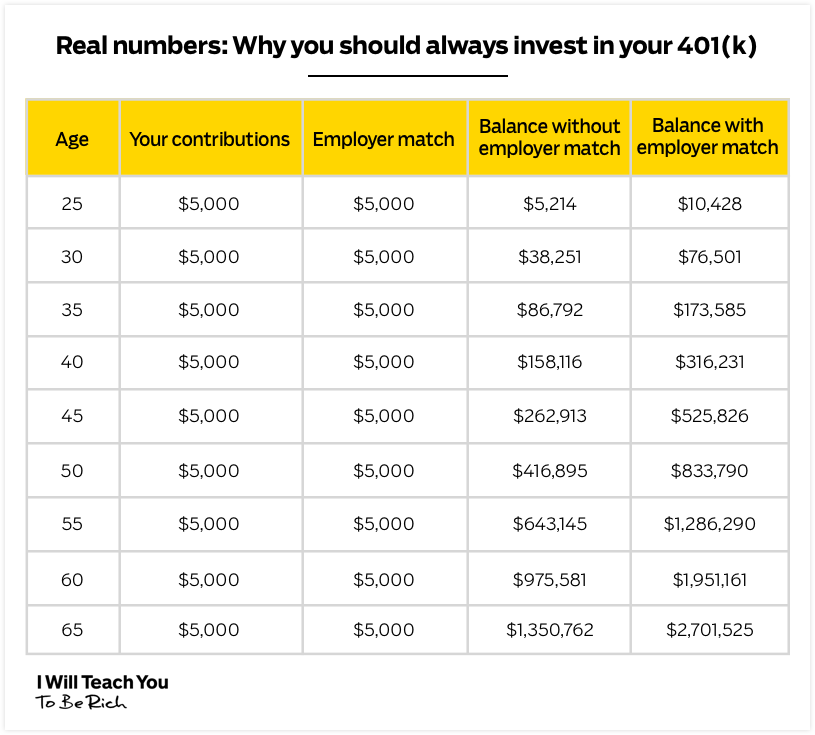
As of 2018, you can contribute up to $18,500 / year. If you can do that, be sure to give me a call because drinks are on you tonight.
Roth IRA
Much like your 401k, you’re going to want to contribute as much as you can to this account. Unlike a 401k, though, you contribute after-tax income to this account.
The amount you are allowed to contribute goes up occasionally. As of 2018, you can contribute up to $5,500 each year.
I suggest putting money into an index fund such as the S&P 500 as well as an international index fund as well.
For more information on both of these accounts, be sure to check out my article on retirement accounts.
Note: If $500/month sounds like a lot, read all the ways you can free up that money with just a few phone calls.
Money tip #7: Start an online business
There’s no question that if you really want to make more money, starting an online business is one of the best ways to do it. It’s also a great way to find freedom and self-worth.
In another article, I explain how to find online business ideas, set some ground rules for starting an online business, dig into your options, and finally present the best business to start.
Learn the ins and outs about starting an online business here.
How to start an online business.
Money tip #8: Meet successful people who hang out with other successful people
Opportunities come through people. Ryan Holiday became the director of marketing at American Apparel … when he was only 21. How’d he do it? Not by RANDOM TACTICS but by taking a systematic approach to meeting people he admired and offering to help. Not by forcing awkward interactions, but by adding value.
Networking doesn’t have to be a scuzzy, inauthentic thing where you hand out a bunch of business cards. Instead try what I call “Natural Networking” by starting off with “informational interviews.”
First, an informational interview is an opportunity to meet someone you’re curious about and learn from them. Maybe you’re curious what a front-end programmer really does. Maybe you want to know what the culture at Google is like. That’s what an informational interview allows you to do.
- Start by brainstorming 10 people you’d like to meet.
- Find something in common with them. It can be you went to the same university, have common contacts, anything that separates you from the rando weirdo emails they get.
- Send them an email. A script you can use is below:
To: Jane
From: Samantha
Subject: Michigan State grad — would love to chat about your work at Deloitte
Hi Jane,
My name is Samantha Kerritt. I’m a ’04 grad from Michigan State (I know you were a few years before me) and I came across your name on our alumni site. [TELL THEM HOW YOU CAME ACROSS THEIR NAME SO YOU DON’T SEEM LIKE A CREEP.]
I’d love to get your career advice for 15-20 minutes. I’m currently working at Acme Tech Company, but many of my friends work in consulting and each time they tell me how much they love their job, I get more interested. [THE FIRST SENTENCE SAYS WHAT SHE WANTS. MOST PEOPLE ARE FLATTERED THAT PEOPLE WANT/VALUE THEIR ADVICE.]
Most of them have told me that if I’m interested in consulting, I have to talk to someone at Deloitte. Do you think I could pick your brain on your job and what motivated you to choose Deloitte? I’d especially love to know how you made your choices after graduating from Michigan State. [THE PHRASE “PICK YOUR BRAIN” IS ONE OF THE BEST WAYS TO ASK FOR ADVICE AND FLATTER, AND “MICHIGAN STATE” REINFORCES SHARED BOND.]
I can meet you for coffee or at your office … or wherever it’s convenient. I can work around you! [THE BUSY PERSON IS MORE IMPORTANT THAN YOU. TREAT THEM ACCORDINGLY.]
Would it be possible for us to meet? [A BUSY PERSON CAN SIMPLY REPLY TO THIS WITH A “YES” — PERFECT. NOTE THAT I DIDN’T ASK FOR THE TIME/LOCATION AS THAT’S TOO MUCH INFORMATION IN THE FIRST EMAIL.]
Thanks,
-Samantha
The single best way to earn money
Most people will focus on the little things. Not you — if you do the above you will be ahead of 95% of your peers. Everything above is a repeatable SYSTEM and not a one-and-done tactic.
With that in mind, I put together a special bonus for you.
In this 11-minute video, I’ll show you how you can create the perfect system to automatically take care of your money every month.
This is the single best way to earn money, save money, and invest money into your Rich Life.
No more panicking if you have enough in your checking account to pay the bills — it’s my gift to you. This system took me 10 years to perfect and it’s being used by thousands of my students successfully.
Enjoy!
How to make money fast: 8 best ways to make money in 2018 is a post from: I Will Teach You To Be Rich.

